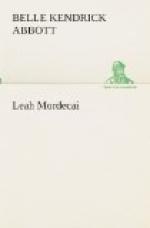The greetings, congratulations, and presentations were over, and Madam Truxton, in all her stately elegance, had at last relaxed her rigid vigilance, and the “finishing class” were free—free to wander for the first time, and that first the last too, among the spacious halls and corridors of the old school building, as young ladies. Free to receive the smiles and addresses of the long-forbidden cadets without fear of madam’s portentous frown.
At length the sound of music rose upon the air. Knotted groups here and there bespoke the preparation for the dance. Sets were forming in drawing-rooms and halls, and impatient feet were moving to the measure of the prelude.
“Miss Heartwell, may I claim your hand for the quadrille?” said George Marshall, bowing before Lizzie at the presentation of Madam Truxton herself.
“I thank you, I never dance, Mr. Marshall.”
“Not dance! How’s that?”
“Never learned, sir.”
“That’s stranger still. I supposed all of madam’s young ladies danced.”
“In general they do,” replied Lizzie, “but from peculiar circumstances I am an exception to the general rule. If you desire a partner in the dance, allow ne to present you to my friend, Bertha Levy. She dances like a fay.”
“Not just now, thank you, Miss Heartwell; if it is not impertinent, I would like to know why you do not dance.”
“Well, it’s a simple story, quickly told; and if you will listen a moment I’ll inform you, if you desire.”
“With pleasure. Go on.”
“Melrose, my native home, in the State of —, is a quiet little town, with little social life and less gayety. My mother, too, is a widow, who has lived in great seclusion ever since my father’s death, which occurred when I was a little child. I have been her only companion in all these years of bereavement and sorrow, and it has never been her desire that I should indulge in any of the pleasures and gayeties that young people are fond of. From these causes my life has assumed a sombre tone that may seem, and indeed is, unnatural in the young. Yet, as I have known nothing else all my life, it is no trial for me to forego the pleasures that are so alluring to you, perhaps, Mr. Marshall.”
George Marshall made no reply, and for a time seemed absorbed in contemplation. He had listened attentively to this simple, half-told history of her life. And as he marked the gentle expression of her spirituelle face, she became in his eyes a model of beauty. The allusion to the death of her father had recalled to his mind the time and manner of his own father’s death—a time when the terrible plague of yellow fever had swept over the Queen City with devastating wing. Observing George Marshall’s silent, absorbed manner, Lizzie continued:
“You think me very uninteresting, I dare say. Young ladies who do not dance are generally so considered. Allow me to present you to some of my friends who will—”




